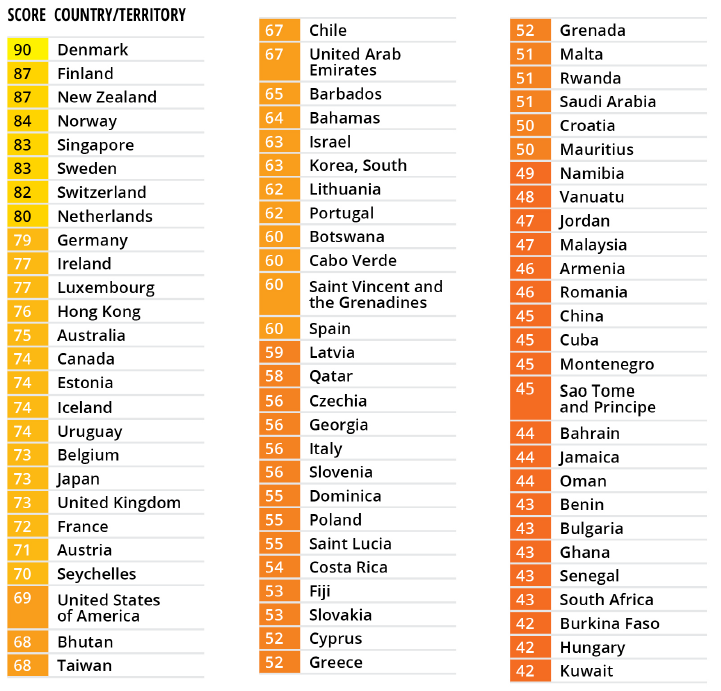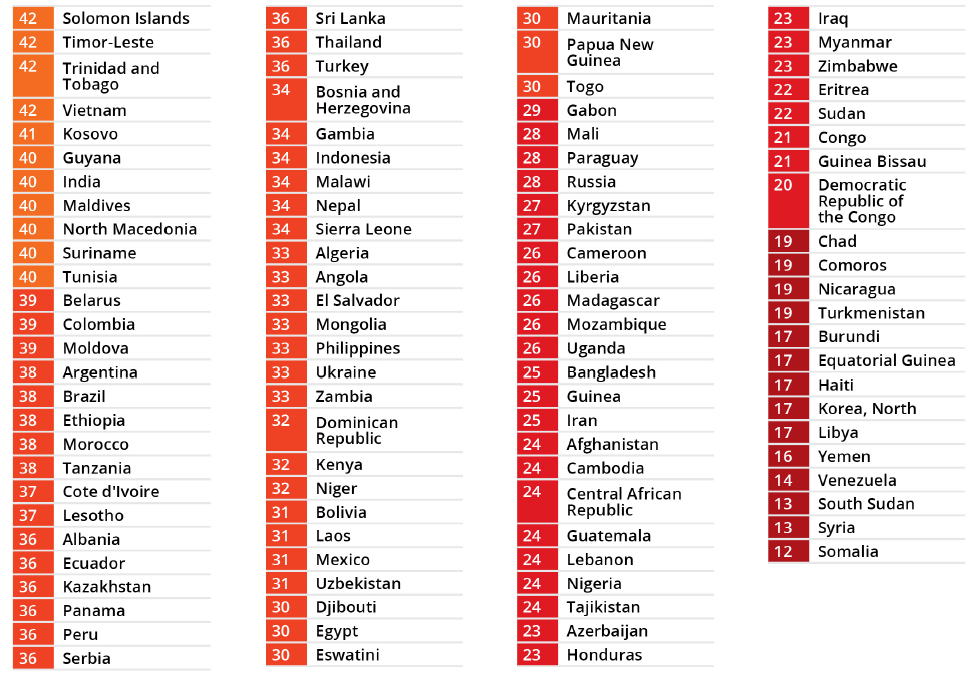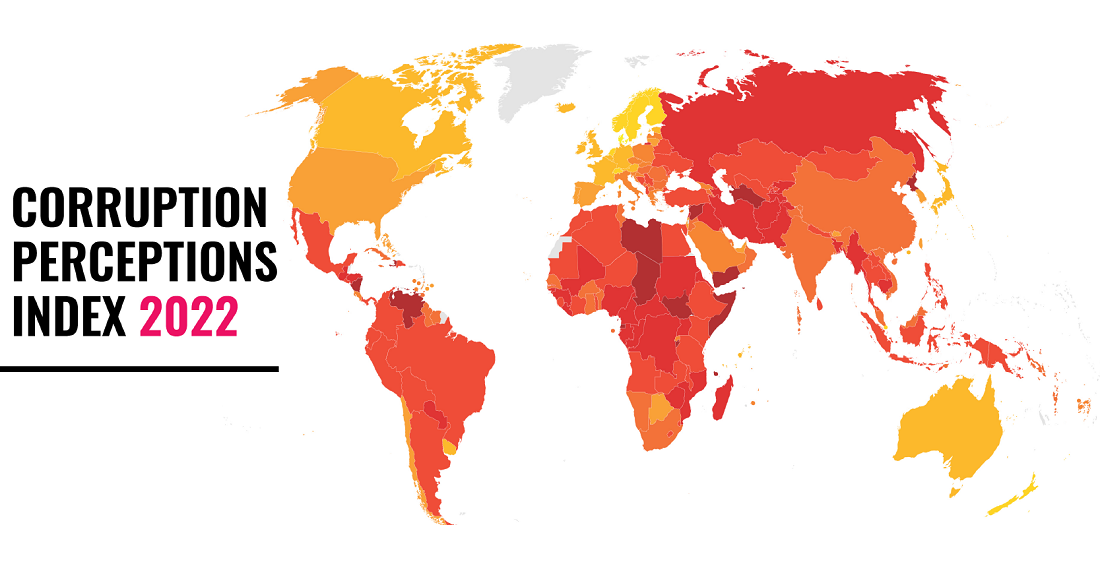Dublin, 31 January 2023
Transparency International (TI) Ireland has urged government and opposition politicians to make a renewed commitment to ethics and anti-corruption reforms as it publishes the Corruption Perceptions Index (CPI) 2022 today.
Ireland’s CPI score is considered to have improved significantly since last year when it received 74 points out of 100. The latest index gives it 77 points out of 100, ranking it in 10th place out of 180 countries. This means that Ireland is now perceived to be less affected by corruption than the UK, Australia, and Canada for the first time since 1997.
The CPI ranks 180 countries based on perceived levels of corruption and Ireland’s score is drawn from the findings of eight separate surveys and studies, conducted by international think-tanks and political risk agencies. The higher a country’s score, the less it is perceived to be affected by public-sector corruption. Neither TI nor TI Ireland conduct the surveys used in the index.
‘Ireland has experienced relatively few corruption-related scandals over the past five years. This contrasts with the period from 1997 to 2012 when the proceedings and findings of the Mahon and Moriarty Tribunals frequently made national and international headlines. Since then, the Oireachtas has passed new laws on whistleblowing, lobbying regulation and anti-corruption. However, international perceptions of Ireland did not shift significantly until this year and it would appear that the absence of any major controversy has influenced perceptions as much as any reform’, said John Devitt, Chief Executive of TI Ireland.

Ireland’s score has improved slowly since 2012, when it suffered a sharp fall on the CPI, receiving 69 points and leaving it in 25th place out of 176 countries.
However, it continues to lag behind some of its Northern European counterparts on the index, with the Scandinavian countries and Finland all scoring over 80 points. Denmark is perceived to be the least corrupt country this year with a score of 90 out of 100. Somalia (12), Syria (13) and South Sudan (13) remain at the bottom of the CPI.
The CPI data is now reflecting recent scandals in the UK, where high-profile controversies surrounding the ‘VIP lane’ award of public contracts for PPE and political donations in return for peerages have done further damage to the UK’s reputation. Canada’s international standing has also suffered as a result of the handling of a major bribery scandal in 2019 and findings that Prime Minister Justin Trudeau had attempted to unduly influence the prosecution of the case.

‘What the CPI shows is that no country is free of corruption and international perceptions can quickly change in response to scandal or failures to prevent and prosecute corruption.
‘No doubt Ireland’s relatively good showing on the CPI this year will be used to suggest that we do not have a corruption problem. Nothing could be further from the truth. There are numerous Garda investigations into corruption inside the Garda itself and other public bodies. Recent controversies involving failures to disclose financial interests by public officials or to disclose campaign donations and election expenses highlight the absence of adequate ethics laws and the risk that electoral laws could be easily flouted’, said Mr Devitt.
TI Ireland has repeated for the restoration of the Public Sector Standards Bill 2015 which was allowed to lapse at the last election and modernisation of how the financial interests of elected officials at both national and local level are disclosed. The Bill would have implemented reforms proposed by the Mahon Tribunal, strengthened the Standards in Public Office Commission and required TDs and officer holders to disclose additional financial interests including large loans and liabilities.
‘Ireland might have improved its score and ranking by avoiding major corruption-related controversies at home recently but there is little doubt that it also plays a central role in fuelling corruption overseas’, Mr Devitt added.
‘The average score for 180 countries on the index has not improved at all since 2012 and more than two thirds of countries (122) are considered to have a serious corruption problem, with scores below 50. The lack of progress in fighting corruption worldwide is in large part due to the role that enablers in the West, including Irish-based banks, wealth managers, as well as legal and accounting professionals have played in laundering the proceeds of that corruption.
‘Much of the money stolen from resource-rich and developing economies winds its way into European financial systems. This is no less the case for Ireland. In spite of the well-documented use of IFSC-based firms to launder the proceeds of corruption and organised crime, the government has failed to resource Irish anti-money laundering agencies and has allowed companies to be established with minimal checks. We have seen a sharp rise in the number of suspect Irish Limited Partnerships established here by companies in secrecy jurisdictions, while the Register of Beneficial Ownership moved with curious haste to prevent journalists and civil society organisations from accessing company ownership details last year.
‘We need to continue strengthening safeguards against both domestic and global corruption, if we are to continue to improve our international reputation and build public trust in our institutions’, said Mr Devitt.
Ends
Notes
For the avoidance of doubt, neither TI nor TI Ireland directly attributes a country's rise or fall on the CPI to any individual.
The Global Corruption Barometer 2021 reported on public experiences and perceptions of corruption in Ireland. The findings suggested that the public perceive that undue influence over public policy is a problem, but that Irish respondents are less exposed to corruption in their daily lives than their European counterparts.
The following sources were used to compile the data to calculate Ireland’s CPI score:
- Bertelsmann Foundation Sustainable Governance Index
- Economist Intelligence Unit Country Ratings
- Global Insights Country Risk Ratings
- IMD World Competitiveness Yearbook
- PRS International Country Risk Guide
- Varieties of Democracy Project
- World Economic Forum EOS
- World Justice Project Rule of Law Index
See the CPI Source Description for more information on the methodology and questions used for each survey:

